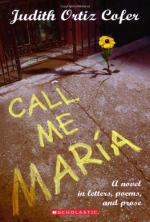|
This section contains 522 words (approx. 2 pages at 400 words per page) |

|
Call Me Maria Summary & Study Guide Description
Call Me Maria Summary & Study Guide includes comprehensive information and analysis to help you understand the book. This study guide contains the following sections:
This detailed literature summary also contains Quotes and a Free Quiz on Call Me Maria by Judith Ortiz Cofer.
“Call Me Maria” is a young adult novel by Judith Ortiz Cofer which follows the first year in New York that 15 year-old Maria spends after emigrating from Puerto Rico. When the novel begins, Maria is having difficulty adjusting to life in America. She feels lost and lonely outside of her home country, yet looks forward to life as an American with an American education. She has moved there with her father, Papi. Papi himself was born in New York to immigrant parents, but when they returned to Puerto Rico, he went with them. As a result, he never felt at home in Puerto Rico and became depressed. Now, he has returned to his true home country in America. He immediately feels at home, slowly but steadily overcoming his depression.
Maria constantly feels a pull between the new world and the old. She loves learning English, but doesn’t want to forget Spanish. She also tries to master Spanglish, a blend of English and Spanish and a language in its own right in the Barrio. Maria admires her father, who now works as an apartment building superintendent, for his hard work and how well-liked he is among the residents. Maria sympathizes with Mr. C., a teacher from the American South, because he misses his home state of Georgia. Maria is also an emerging poet, putting her thoughts and feelings into poetry which earns the approval of her favorite teacher, Mr. Golden, who handles English class. Mr. Golden likens Maria’s poetry to Neruda’s, who wrote about simple things. Mr. Golden gives Maria a volume of Neruda’s poetry, which helps inspire her.
At the same time, Maria’s grandmother, Abuela, comes to visit. Abuela dislikes America, and the Barrio especially. To her, it is nothing like home with is beautiful scenery and friendly people. Papi points out to her that no one was ever friendly toward him, saying most made fun of him racially for sounding white and being born in America. Papi knows that many immigrants have a tendency to romanticize and idealize life before America, often forgetting the ugly realities that forced them to leave their homeland in the first place. When Abuela returns home, she leaves behind a journal of her time spent in America, in which she criticizes everything from New York’s architecture to the weather to culture such as theater.
In the spring, Maria’s mother, Mami, a teacher, comes to visit. Mami stays only very briefly, saying she and Papi will be getting a divorce. Mami does not want to leave Puerto Rico, and has been seeing a fellow teacher named Julio despite still being married. Papi is deeply hurt, but does his best to move on by focusing on work and on Maria. Maria tells Papi he is her hero. Mami offers Maria the chance to come back to live with her and Julio, but Maria insists she is home now. As the spring comes on, Maria begins to grow happier with her life. She especially comes to love learning English, making every new word that she learns her own.
Read more from the Study Guide
|
This section contains 522 words (approx. 2 pages at 400 words per page) |

|



